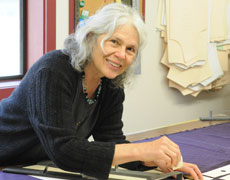I’m reconsidering “conscious consumerism” this Earth Day
Posted by Rose on 20th Apr 2022
It's fine to make healthy buying decisions, but we need to muscle up and do more to save the world.
The celebration of Earth Day each year seems to come with a growing sense of urgency. As I survey the many signs of our shared environment under increasing stress, I’m coming to see that enlightened consumerism is no fix in itself for the existential threats we and everything that lives on Earth face. I’ve grown to see that we will have to go beyond conscious consuming and put our muscle, money and personal energy into social and structural change. Though our efforts to consume wisely are certainly worth doing in making healthy and sustainable choices for ourselves, they don’t in the long run address the systemic realities that drive climate disruption or the social and economic-justice issues that lie behind it.
Choosing sustainable fashion is a good first step, but change needs to reach far beyond our personal sphere.
I follow the work of sustainability journalist Alden Wicker, and her take on things seems to me clear-eyed and unequivocal. Part of my determination to do more than simply be an educated consumer came from an article she wrote about “feel-good” economics and how they can give us a false sense of having done something worthy to save the Earth. Wicker is all about structural change from the bottom up; she views consumption, enlightened or otherwise, as part of the problem. As citizens of a shared Earth, most of us living in industrial societies consume far more than our proportionate share of the Earth’s resources. Wicker is brutally dismissive of efforts to make better consumers of ourselves: She says instead, "Take the money, time, and effort you spend making ultimately inconsequential choices and put it toward something that really matters."
I might not go quite as far as Alden Wicker. There are obviously a range of choices we make every day that have consequences for everyone, and of course, some of those choices will have more impact than others. But Wicker’s piece challenges us to lean into our commitment to help protect the Earth. She offers a handful of suggestions for concrete actions and mental adjustments that will make more profound differences:
- Instead of buying expensive organic sheets, donate that money to organizations that are fighting to keep agricultural runoff out of our rivers. Instead of driving to an organic apple orchard to pick your own fruit, use that time to volunteer for an organization that combats food deserts (and skip the fuel emissions, too).
- Instead of buying a $200 air purifier, donate to politicians who support policies that keep our air and water clean.
- Instead of signing a petition demanding that Subway remove one obscure chemical from its sandwich bread, call your local representatives to demand they overhaul the approval process for the estimated 80,000 untested chemicals in our products.
- Instead of taking yourself out to dinner at a farm-to-table restaurant, you could take an interest in the Farm Bill and how it incentivizes unhealthy eating.

Happy Earth Day!
For a deeper dive into ways we can make meaningful, systemic changes, check out this report by the United Nations Environmental Programme, But really, it doesn’t take much digging to discover places we can all help. Often they’re right in our backyard. Living as I do immediately adjacent to forest managed by the U.S. Bureau of Land Management (the other BLM), I’ve become involved in an effort to reign in the agency’s sales of ancient forest stands to timber companies. Changing the BLM’s institutional perspective of our woodlands as assets to be “harvested,” as they benignly put it, will take a fundamental change in how humans view resources like forests. The group I work with seeks permanent protection for our public lands so we don’t exhaust ourselves fighting one timber sale at a time.
The BLM has in recent years begun to hijack the language of the environmental movement. BLM describes clearcuts in their reports as “group selection logging" and “regenerative forestry.” They claim to be doing this work for wildfire prevention, when in reality their activity increases fire severity while delivering cheap trees to industry. To put an end to this kind of greenwashing will take a radically different way of looking at our place on the Earth. It’s up to each of us to make that change a reality. What are you up for?
Share:






